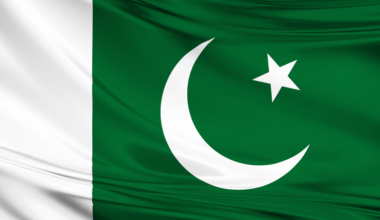Recently a friend sent me a couple of links showing some Shias using hate speech against the first three caliphs of Islam and Hazrat Ayesha. One of the video showed about fifteen to twenty people gathered at some place in the UK and abusing the wife of their Prophet. I was shocked. Shias must say no to such hatemongers in their midst. While these guys form a very small minority of Shias, the tall shadow of their actions falls on everyone in that community. In this age of information, their actions are filmed and propagated all over the world, including Pakistan. Denigrating the figures anyone has built one’s life and faith around is downright inhuman. More than anything else these chumps do significant harm to Shias, as because of their mindless acts and speech somebody gets killed in Parachinar or gets blown up in Quetta or is murdered elsewhere. By all ethical and human standards it is not right to speak insulting words — those words without social value, directed to a specific individual, that would provoke a reasonable member of the group about whose religious icon the words are spoken.
Don’t get me wrong. I am not naïve enough to think anger over religious insults alone can explain the violence against Shias. No, but these insults are indeed cleverly used by the perpetrators to kick up the frenzy and to deprive their victims of general sympathy. There are some topics which can be discussed in a respectful and educated manner, when the context so demands, but we mast mark the line between a reasonable discussion and ignorant buffoonery. Such acts of buffoonery also create an environment that makes it more difficult for others to provide genuine critique. There is also a difference between sticking your own neck out for what you believe in and endangering other people. These guys mostly do it from safer confines and betray their people in regions which are so wracked by war, poverty and oppression that many people feel they have nothing left but religion. And when that is desecrated, what do you have to lose by slaughtering a few?

What I know for a fact is that such rabid behaviour is not representative of Shias in Pakistan or elsewhere. While these lunatics are a fringe minority whose actions imperil millions of Shias, Shia stereotypes and those who unduly look up to Iran are also a small minority. Most of the Shias are quite ‘normal Pakistanis’ like most of the Sunnis. They are wedded to conspiracy theories. Their support of cricket team constitutes the most, and often sole, ardent manifestation of their patriotism. They too do not see any paradox in being avid fans of Indian movies and blaming India for all that is wrong with Pakistan. They also think that saying ‘Allah Hafiz’ instead of ‘Khuda Hafiz’ makes them a better Muslim.
What is also important to know is that about 90% of practicing Shias in the world follow either Ayatollah Khamenei or Ayatollah Sistani, the two most important religious authorities at the moment. Both these leaders have issued religious decrees clearly and emphatically enjoining their followers to not to use any foul language for the first three caliphs of Islam and the wives of the Prophet. These injunctions clearly demonstrate how out of place the vicious speech is in a community that values the dignity of all. Hence, the people indulging in such foul behaviour do not represent any significant contemporary stream of thought in Shia theology and must be curbed. However, even though such hate speech comes from isolated fringe elements, themselves despised by a majority of the Shias, we should not regard the harm as insignificant. The flared-up propagation of a few isolated incidents can have a disproportionate effect. Think about it. It’s always easier to defend someone’s right to say something with which you even remotely agree. But in a decent society and as a dignified human being, you also have a duty to defend speech to which you might strongly object if you were a neutral –let alone the aggrieved- party.

Such speech doesn’t just impart incorrect information and stereotypes about Shias, but it makes the job of extremists much easier in targeting Shias by justifying apostatization, violence, and discrimination against them. Not only must Shias guard against an irresponsible minority of Shias stereotyping all Shias but they must also stop such people from starting forest fires with a match, which is then amply fuelled by apostatization and hate.
Shia history is, in particular, a record of important and dramatic events, with Karbala the most important one, which have often been profoundly affected by great speeches. Each era of Shia history boasts its own unique orators, people whose words have stood the test of time because their messages have proven to be both transcendent in meaning and indicative of the times in which they were spoken. Speeches in Shia community are not only a source of the remembrance of such events but they also serve as educational documents for scholars in later decades and centuries because they show what this segment of Muslim society was concerned about in a given period of time and how people expressed their views. Thus in Shia tradition, speeches illustrate the valued method of addressing important information to people. Orators –from Sheikh Sudooq to Allama Rasheed Turabi- historians regard as great are, at least in part, great because they knew how to reach the universal audience of their lifetime with the words and the narratives they employed. As the things have deteriorated in Pakistan and the extremism has become more rife, orators’ styles and content have also changed in manners that make oratory in Shia tradition now a declining art and learned people judge contemporary speakers unfavorably against the giants of the past like Rasheed Turabi. What is worse, however, is that a few of these orators resort to crass arguments and rabble-rousing in order to paper over their lack of knowledge and homework. I do hope that such speakers can take more seriously the damage such speech does, and to overcome the knee-jerk, impulsive, and thoughtless arguments that often characterize their speeches. They play in the hands of Takfiri extremists by abetting them in fanning hostility, violence, and discrimination against Shias in general.
THE CURSE OF APOSTATIZION – THE REAL LOCOMOTIVE OF HATE
It is an established fact that apostatization nudges the Muslim sentiments to suppress usual human revulsion to murder. Apsotatization in Muslim societies always leads to mayhem. The objects of apostatization in a Muslim society are deprived of the assurance that the society regards them as people of equal dignity. Ever since Z A Bhutto’s government bowing -for its own gain- to the extremists, resorted to every crass argument in the book to carry out the murder of reason and sanity in Pakistan by declaring Ahmedis non-Muslims, Pakistan has been sliding down the path of extremism.
In 1986, many major Deobandi seminaries of Pakistan and India issued Fatawa of apostatization against Shias, thus upholding the manifesto of the Sipah-e-Sahaba, a party formed in Pakistan in 1985 on the basis of its demand that Shias be declared non-Muslims by the state of Pakistan through an amendment in the Constitution. These apostatizing Fatawa were managed through a cleric, Manzur Numani, based in India. Funded by the Saudi charity, Rabita-ul-Alam-al-Islami, he wrote to the Deobandi seminaries of India and Pakistan asking them to give their Fatawa on the Shia faith. In 1986 all of them sent to him Fatawa declaring the Shia infidels or non-Muslims. Most of these referred to Fatwa-al-Alamgiri, a 33-volume magnum opus compiled by the Mughal emperor Aurangzeb, which had adjudged Shia as heretics. These Fatawa also refer to Shah Waliullah as their authority. A compilation of these Fatawa was published by Manzur Numani in Lucknow in 1987. He also published a collection of these Fatawa serially in the Lucknow-based renowned journal Al Furqan from December 1987 to July 1988. These Fatawa, which started a process of the rejection of Shias, are on record since 1986 and continue to be circulated by the extremist organizations. These Fatawa have also been widely circulated in Quetta abetting the attacks on Hazara Shias or in FATA and Northern Areas to organize massacres of Shias.

Though Apostatizing personifies Hate, we must suffer no illusions; it is humans who hate. We need to understand that the same people orchestrating Shia Genocide also kill Sunnis in their spare time. Once they have taken care of Shias they can switch to doing it on a full time basis. They embody Apostatizing Hate, which has no mercy, let alone tolerance, for diversity, which manifests itself in various forms. From apostatizing to suicide bombing to the systematic murder of a certain group of people, Apostatizing Hate spares no one in its quest for dominance. It is the crime against humanity, the bombing of Sufi shrines, the architect of Shia genocide, and the perpetuator of violence past, present, and future against the Sunni Clerics and all others who dare to differ from it. During the past decade, Apostatizing Hate has demonstrated to the world what it is capable of in an unimaginable magnitude. It shows us the sick and twisted mentality of a people that it brainwashed and the atrocities that transpired from the ideology of its conquered minds. Atrocities ranging from systematic killing of women and children to ruthless beheading of the security forces.
At the same time it has also exposed the consequences of apologist leaders and thinkers who could have helped the victims of hate. They fail to understand that fundamentalism and terrorism are both tools of Apostatizing Hate. One is used to exercise violence whereas the other is used to influence gullible minds and to infiltrate intelligentsia, media, and state institutions. It appeals through negating the cultural aspects and heritage. The literal understandings of Islamic norms are employed to dismantle the cultural elements. The final objective of all their strategy and activities remains common in the seizure of power and imposing their world vision on all. In short apostatizing Islam is indeed a philosophy of exclusivism, fanaticism, intolerance, violence, and dogmatism, which is unable to cope with the demands of the present and is unwilling to live with the realities of a multicultural world. This philosophy of violence, conflicts, and terror has to be dealt with sternly and rooted out. This is a war that the humanity cannot afford to lose, and least of all Pakistan.
That it is allowed to take place betrays the apathy that pervades Pakistani society. After every attack like the last one in Quetta, people say never again. Never again will we ignore the warnings and let such hate and evil destroy the lives of our fellow citizens. But this promise has been broken numerous times, often before the dead are even buried. Not only must we stand up together to stop this, the history and lessons of the Apostatizing Hate must be passed onto future generations and taken seriously to understand the havoc such rage, if allowed to prosper, can wreak. We must recognize the capacity of Apostatizing Hate because it has no boundaries. It has traveled across oceans and continents, squeezed the trigger of Taliban soldiers in Mazar e Sharif, killed thousands in Africa, maimed men and women alike in Iraq and Syria, lynched and bombed innocents in Pakistan, poisoned the waters of River Kabul with blood, climbed the far-off mountain sides of Gilgit and Hunza and currently stretches across from Indonesia to the vast desserts of Mali and moves the mouths of those who preach against the acceptance of minorities, apostasy of Shias, infidelity of non-Muslims, and culpability of the Sunnis who do not subscribe to its gospel of odium.
TODAY’S PAKISTAN
Today’s Pakistan is a far cry from the Pakistan I grew up in. I have been a first-hand witness to the metamorphosis that has taken place over the past over thirty years. Although Mullahs –abetted and used by the unpopular rulers of the country and Pakistan Army- had started making inroads right from the time of its creation, Pakistan of up to seventies was a liberal and a peaceful country where sectarian divides were far less palpable than differences along ethnic or even political lines. I always grew up in multi-sect environments (comprising Bralevis, Deobandis, Shias, and Ahle-Hadith, and also Ismailis, Bohras, Ahmedis, and the then minorities alike) and while as we grew up we became aware of the existence of various schools of thought, we would never witness the kind of intolerance that is rife today. Everything that Islam and the Quran point to –absolute goodness, peace, service to others, truthfulness, honesty, justice- has slowly but surely diminished in Pakistani culture. It is now common for Mullahs of a group to compete with one another for group approval by trying to make the most clever and most forceful statements against opponents

While the Army always used Mullah for its aims, in the post-Zia era the secular politicians have also pandered to the religious zealots. Both Benazir Bhutto and Nawaz Sharif co-opted the clergy and abstained from taking measures towards stopping the growing tide of religious fundamentalism. Hence the majority in Pakistan now subscribes to pan-Islamist, anti-American, anti-Indian and anti-Israeli ideas and conspiracy theories, even though a significant minority continues to abhor Islamist violence and sees fighting extremism and normal relations with India and the US to be in the national interest.
SATE OF PAKISTAN MUST CURB APOSTATIZATION, IN PARTICULAR, AND HATE SPEECH
It is worth mentioning here that laws in Pakistan do not prohibit apostatizing Fatawa as private edicts that violate the sovereignty of the state. Neither can such apostatizing Fatawa be adjudged as illegal or terroristic under Ant-Terrorism Ordinance of 2001, which was meant to deter sectarianism.
Only in Pakistan is vilification against millions less harmful than vilification against one. Why?
In fact if Pakistan has to move on in a meaningful way, it must do something about hate speech and particularly apostatizing, the main narratives of intolerance in the country. By condoning hate language in media, school texts and places of worship; we have created an environment where extremism is the hottest-selling commodity. A large class of Mullah now ekes out their livelihood and popularity both by preaching hate. The price of neglecting the propagation and spread of religiously sanctioned and politically motivated hate language and incitement in Pakistan is now enormous. In a country where we can’t afford the luxury of decades of change and reform, state and masses alike have to play an active role in weeding out hate from the society. This is Pakistan’s single biggest need at this moment. All hate speech must be banned. This includes vilifying any sect or group as well as denigrating venerated figures of any religion or sect. Hate crimes and atrocities must be promptly punished, as a matter of priority, to set examples. An empowered commission must be set up to monitor and investigate all reported violations.
The state must precisely define hate speech and then enact laws and organizational policies to severely punish anyone who uses it. These laws should empower the police to investigate alleged incidences of hate speech. Guilty parties should be tried and punished according to the law. The community’s well-being is society’s most important goal and an individual’s right to free speech may be limited in the interests of community harmony. We believe that treating people with fairness and dignity justifies at least some free-speech restrictions and that eliminating or reducing hate speech is a sufficiently compelling goal to justify government’s writ in Pakistan.

Strict monitoring on the ground and an effective implementation of law must be preceded by the enactment of a comprehensive legal framework. The laws must encompass three aspects:
PUNITIVE LAWS: These should include perpetrator-focused policies covering face-face-defamation, tort by individuals, hate speech targeted at minorities and marginalized groups, insult of certain identified religious figures, and group defamation.
RESTRICTIVE LAWS: These should also include perpetrator-focused policies and must impose content-neutral restrictions on harmful speech. This will help punish hate speech at marginalized groups, in particular.
EMPOWERING LAWS: These should include target-focused policies, affording quick dispensation of justice and punishment on the cases reported by the targeted group. The fact of life is that in today’s Pakistan religion has significant power for moving social change and it is imperative to harness it to create unity and tolerance instead of capitalizing on differences for parochial objectives. That is the reality of the day is that the language of effective discourse in Pakistan is religious and all mainstream religious leaders must undermine pernicious ideologies of hatred directly at their source when they are promoted by militant groups. Whereas those who create strife must be apprehended and visibly punished.
Apostatization MUST BE BANNED
Apostatization in any form, which denies Islamic credentials of another group, must be banned
The curriculum in normal schools and religious madrassas both should be rigorously controlled to weed out any hate material. All textbooks must promote tolerance and understanding among all human beings. The materials distinguishing people into ‘us and them’, on any count, must be removed. This mentality has no end. The emphasis should be a transcendent Pakistani identity and religious education, if at all, in any institution must be devoid of any denigration of or comparison with others – Muslim and Non-Muslim both.
LET GO OF HISTORY
As Iqbal said, Muslims have always been lost in the history and fighting over the past and even today I see hordes of young folks subscribing to different religious orders and accepting the man-made interpretations without question. In most cases the allegiance to sectarian schism is indelibly indoctrinated in early childhood. These sectarian doctrines have been constructed over centuries and are mostly mired in history.
In no religion in the history of mankind have such minor differences in fundamental beliefs led to so much mayhem and bloodshed. Instead, what human race continues to outgrow we keep on reliving. Burdened by an unpleasant and divisive history, sectarian harmony staggers under impossible difficulties as many Muslims find it more passionate and intense to delve in the narrations of history rather than coming together to use the basic tenets of Islam to deal with the modern challenges. However, in today’s world there is no reason that Muslims should remain locked in a theological and sectarian prison that justifies one sect’s adverse view of other sects within Islam. While all Muslims largely agree on the Quran, many of the sectarian differences have arisen merely because by the time of the formative period of Islamic law the Muslim society had become firmly sectarian and has remained so ever since. However, with modern insights about human nature and social and economic changes, the practice of religion has to adapt itself to the challenges of current world. After all, other beliefs also continue to evolve. For example, male monarchic rule was deeply embedded in the Muslim psyche and to question the rights of monarchs (as Khalifas or Sultans) to rule was almost unthinkable and was viewed as apostasy by a majority of the subjects. Today an increasingly wide majority of Muslims acknowledge that democracy is a better system than monarchy or Caliphate and their Islam is not any less devoted for so believing. So why must we remain mired in sectarian differences which are not relevant to the social, scientific, educational, and economic context of present times.
We must let these myths die, PLEASE.







